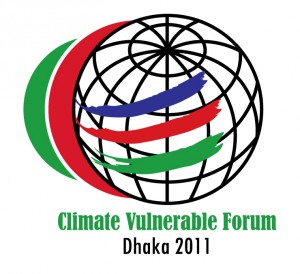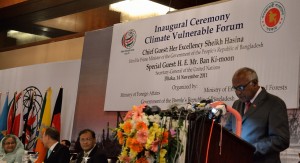November 14, 2011

Speech presented at the Inauguration Ceremony at the Climate Vulnerable Forum 2011 in Dhaka, Bangladesh
By H.E. Mr. Ahmed Naseem, Minister of Foreign Affairs of the Republic of Maldives
It is a great honour and a pleasure to be with you all here in Dhaka for the second Climate Vulnerable Forum.
On behalf of the Government of the Maldives, I would like to thank the Honourable Prime Minister of Bangladesh and her Government for inviting us, for their hospitality and for their extraordinary efforts in organising this important meeting. I would also like to thank H.E. Mr. Ban Ki-moon, Secretary-General of the UN for being with us today; all the assembled ministers and high-level delegates for their attendance; and last but not least DARA for its invaluable support.
The CVF was convened by H.E. President Mohamed Nasheed in 2009 as a unique new forum designed to amplify the voice of the world’s most climate-vulnerable nations and to position those countries not as the victims of global warming but rather as the voice of reason and as the agents of change.
The outcome of the First CVF in the Maldives – the Male Declaration – was, I believe, crucial in changing the parameters of the global debate on climate change. Prior to the Male Declaration, intergovernmental talks had become obsessed and divided over the issue of new binding commitments to cut greenhouse gas emissions. On one side, the developed world, by and large, refused to consider deeper emission cuts without meaningful mitigation commitments from the large emerging economies. On the other side, key developing countries, using G77 as a vehicle, were adamant that they would not accept such commitments and that responsibility for climate change and thus responsibility for dealing with it must rest solely with the industrialised world.
Squeezed between these two poles were the CVF nations; the only countries brave enough to point out the obvious – that to keep warming below 2 degrees, to save vulnerable countries like Bangladesh and Maldives from extinction, every country on Earth would have to agree to change, to play its part, to move away from carbon-intensive development and towards a greener future. And, moreover, that it is in every country’s social and economic interests to do so.
And that was the message delivered by the world’s most vulnerable countries at CVF1. With the Male’ Declaration we “emphasised that…action is required by all countries,” we “underscored that maintaining carbon-intensive modes of production will incur enormous social and economic costs, whereas shifting to a low-carbon future creates wealth, jobs, and new economic opportunities”, we expressed our conviction that “those countries which take the lead in embracing this future will be the winners of the 21st Century” – and asserted our determination, as vulnerable States, to be amongst those winners.
Today, conventional wisdom suggests that Copenhagen was a failure. I beg to differ. In my opinion, the Copenhagen Accord was not an admission of defeat, but the first step on the road towards a solution – a solution based on the vision laid down in the Male´ Declaration. That vision was simple: that global warming will only be halted when States realise the futility of arguing over whom should cut emissions, and begin competing to become the leaders of the new industrial revolution – a revolution based not on the finite power of coal and oil, but on the infinite power of the sun, sea and wind.
“Global warming will only be halted when States realise the futility of arguing over whom should cut emissions, and begin competing to become the leaders of the new industrial revolution.“One only has to look around today to see evidence that the world did begin to turn a corner in Copenhagen. Billions of dollars are now invested each year in low- carbon technologies, and this has resulted in double-digit growth in renewable energy and the broader green economy. Investment in renewables, excluding large hydro-electronic power, rose in 2010 to about 130 billion dollars – a 40% increase from the 2008 level. Equally important, growth is not restricted to the industrialised world. Low-carbon investments in developing countries, especially China, are also soaring. Indeed, by 2025 China is expected to become the undisputed world leader in renewable energy capacity – overtaking the European Union.
President Nasheed has always held that the best way to stop climate change is not to demand that States cut emissions but rather to encourage them to invest in low- carbon technology and renewable energy. That was the ultimate aim of the Maldives’ decision to commit to carbon neutrality by 2020. And it was a key aim of the CVF – to show the world that despite our vulnerability and despite having contributed almost nothing to the problem, CVF countries are willing to take the lead in directing and moving the world towards a solution to global warming.
I believe therefore that we can all be proud of the CVF’s contribution to international efforts to address climate change.
However, much remains to be done if the CVF and the wider international community are to halt and reverse climate change before it is too late.
That is why this meeting and your presence here in Dhaka is so important.
It is the hope of President Nasheed and the Maldives delegation that this third meeting of the CVF will achieve five things:
- Remind the world of the plight of the most climate-vulnerable countries, and in-so-doing confront the growing sense of apathy and reenergize the international community to act.
- Send out a strong progressive message to COP17 in Durban, encouraging the UNFCCC to establish a new legal framework on climate change which encourages and helps States take positive action, in other words to invest in low-carbon technology, rather than only demanding that they accept negative obligations – namely to cut emissions.
- Inspire and lead this reorientation of the global debate on climate change by updating the international community about progress made by CVF States to move towards low-carbon development.
- Understand and explain the main challenges and difficulties faced by developing countries in shifting to a low-carbon development pathway, and to give guidance to the international community regarding how it can best help and support that shift. In that regard, the CVF must send out a strong message about the accessibility of the CDM, about the establishment of the Green Fund and about how to best leverage private capital.
- To institutionally-equip the CVF to deliver these messages and results in the long-term, and to ensure that its impact is not only felt once a year but rather on a continual and sustained basis.
The Maldives delegation pledges itself to work with all of you to achieve these goals.

Share this